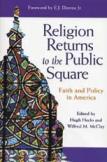Faith Matters
The title of this collection of 11 essays offers the hope that some consensus has developed on the way religion should coordinate with government. Alas, the question is too complex. There is not even consensus on the meaning of the “public square.”
But these essays, written by experts of all faiths, offer informative insights and even inspiration. America is a nation whose institutions, as the U.S. Supreme Court put it in 1953, “presume the existence of a supreme being.” But this does not inhibit some Christian partisans, who want the divine to be more prominent, or the secularists, who want the divine to be strictly private.
The most recent spokespersons in America’s never-ending church-state struggle are those who want religion to be more visible in the nation’s public schools and in the formulation of America’s national and international policies. These individuals—generally neo-evangelicals—claim that they are returning the United States to its roots as a nation under God. They have invented the vague concept of the “public square” and the idea that the churches deserve a “seat at the table.”
This impressive study, fathered by the Woodrow Wilson Center for Scholars in Washington, D.C., is grounded on the premise that religion is inevitably public in a political sense. Faith matters—especially and in a unique way in America. But the reader will immediately notice that there is here no identifiable spokesperson of the Jewish community. Nor is there a scholar to express the position that religion flourishes best when it does not depend on any endorsement from the government.
John A. Coleman, S.J., explains the Catholic position that allows, even requires, a position on public morality. The Second Vatican Council’s “Declaration on Religious Freedom” affirms that Catholics should be free to “show the special value of their doctrine in what concerns the organization of society and the inspiration of the whole of human activity.” Other religious groups are guided by a similar approach. But whose priorities take precedence in an America where some 100 million people do not adhere to any form of organized religion?
The readers of Robert Bellah and the copious literature that has developed from his insights will find these essays instructive. But the proposed questions surrounding the nature and formation of public morality are not resolved and perhaps not even well formulated in this anthology. There is a vague feeling that a composite of pan-Protestantism, theism and an unspecified “faith” are needed to keep America faithful to its spiritual roots. The proponents of these beliefs seek, often in political ways, to insert them into the nation’s public morality. But there are counterforces that reject some of the nation’s traditional positions on topics such as abortion, homosexuality and prayer on public occasions. The Supreme Court has up to now made the final judgment on those topics. Some voices in this volume want the U.S. Supreme Court to be eliminated from the resolution of moral and spiritual issues.
The appropriate interaction of politics and religion seems to get more complicated as the de facto hegemony of religion seems to erode in America. Some critics, like Stephen Carter of Yale, suggest that favoritism toward religion is turning into a new hostility to belief itself.
In a thoughtful preface to this volume, the well-known Catholic journalist E. J. Dionne Jr. claims that the “history of the United States is in large part a history of religion’s role as a prod to social justice, inclusion and national self-criticism.” This may have been so in the past, but will/should religion have that role in the next generation or century?
That is the complex question dissected in this troubling series of probing essays. There are no clear answers to questions that are themselves seldom clear. But the core issue of the place of religious faith in the public life of America is so crucial that it deserves the constant attention of everyone interested in the future of public morality in a nation that will be uniquely influential in the century to come.
This volume, enhanced by the prestige of the Woodrow Wilson Center for Scholars, must be only the beginning of the never-ending quest to discover the answer to a burning question, which is likely to be the foremost issue facing the American nation in the years to come.
This article also appeared in print, under the headline “Faith Matters,” in the July 7, 2003, issue.








